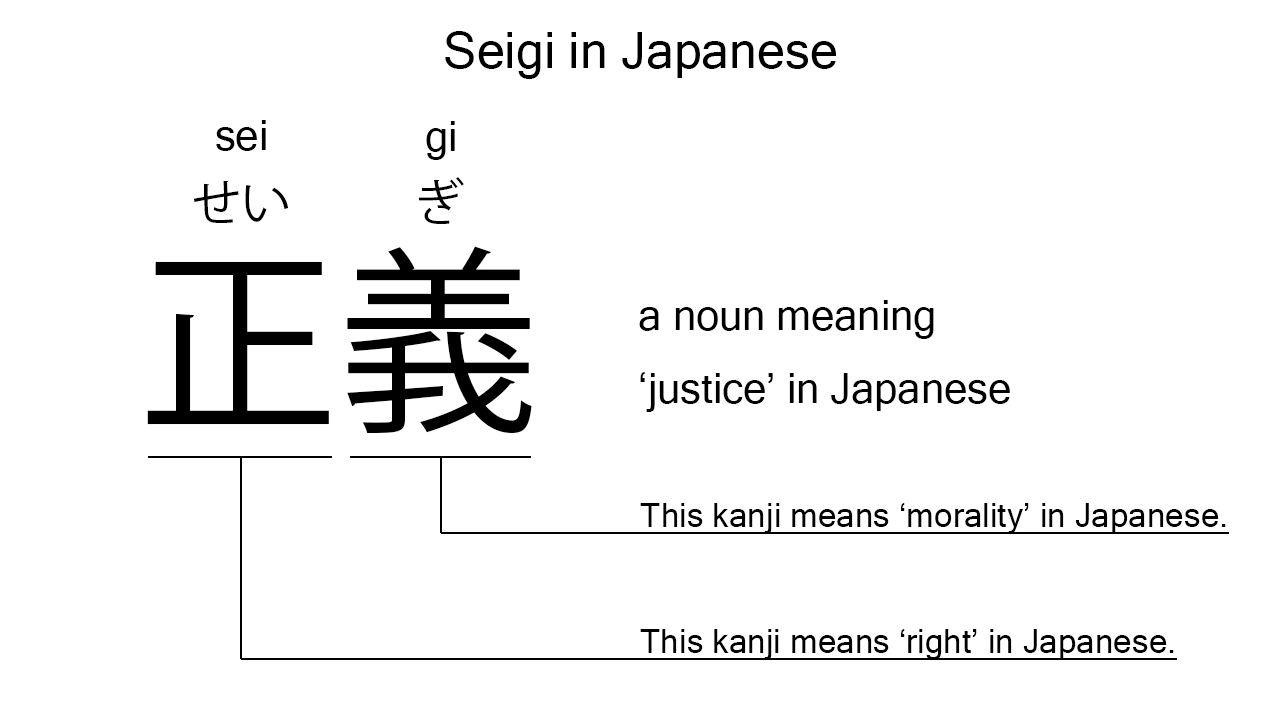What does “seigi” mean in Japanese?
Native speakers say “seigi” often to mean ‘justice’ in Japanese. Perhaps, some Japanese learners know this word as it is sometimes used in Japanese movies, novels, manga, anime, and the like. In this blog post, however, I will explain this word in detail based on its kanji expression. And also, I will explain how to use it through example sentences. My explanations would help Japanese learners understand “seigi” more clearly. Then, let’s get started!
Contents
Definition and meanings of “seigi”
Let me start with the definition and meanings of “seigi”.
- seigi – 正義 (せいぎ) : a noun meaning ‘justice’ or ‘righteousness’ in Japanese.
The definition and meanings are simple and clear. To understand this noun more clearly, however, let me explain its kanji characters in detail, one by one.
Seigi in kanji
The kanji expression of “seigi” consists of the following two kanji characters:
- 正 : a kanji character often used to mean ‘right’ in Japanese. This can also be found in other words like “tadashii“.
- 義 : a kanji character often used to mean ‘morality’, ‘sense’, or ‘honor’ in Japanese.
From these two kanji characters, we can understand that the formed noun literally means ‘right morality’ in Japanese. This literal interpretation is very close to the actual meanings, I think.

When we meet new kanji expressions, we should check their kanji characters in detail to understand their meanings clearly and deeply. In many cases, kanji characters tell us a lot about the meanings of the expressions they form. Actually, here, we could get the better understanding of “seigi” through the detailed kanji check above.
So far, I’ve explained the definition and meanings of “seigi” together with its kanji characters. Then, let me explain how to use it through the example sentences below.
Example #1: how to say “justice” in Japanese
「seigi wa katsu」 to kanjo ga it ta – 「正義は勝つ」と彼女が言った (「せいぎはかつ」とかのじょがいった)
“Justice will prevail,” she said.
Below are the new words used in the example sentence.
- wa – は : a binding particle working as a case marker or topic marker. In the example, this works after “seigi” to make the subject in the clause.
- katsu – 勝つ (かつ) : a verb meaning ‘to win’, ‘to conquer’, or such in Japanese. In the example, this has been translated as ‘to prevail’.
- to – と : a case particle working as a quote marker. In the example, this works after the clause to indicate what she said.
- kanojo – 彼女 (かのじょ) : a pronoun meaning ‘she’ in Japanese.
- ga – が : a case particle used to make the subject word or the object word in a sentence. In the example, this is used after “kanojo” to make the subject in the sentence.
- it – 言っ (いっ) : one conjugation of the verb, “iu“, which means ‘to say’ in Japanese. In the example, it has been conjugated for the better connection with its following word.
- ta – た : an auxiliary verb used after a verb, adjective, or auxiliary verb to make its past tense form. In the example, this is used after “it” to make its past tense form, “it ta”.
This is a typical usage of “seigi”. In this example, it works together with the binding particle, “wa”, to become the subject in the clause.
Example #2: another usage of “seigi”
seigi no hantai wa mou hitotsu no seigi desu – 正義の反対はもう一つの正義です (せいぎのはんたいはもうひとつのせいぎです)
The opposite of justice is another justice.
Below are the new words used in the example sentence.
- no – の : a case particle joining two nouns. Normally, the first one can work as a modifier to describe the second. In the example, this works to join “seigi” and “hantai”. The formed phrase literally means ‘the opposite of justice’ in Japanese. Word orders in Japanese and English are different, but the role of this case particle is similar to that of the English preposition, “of”.
- hantai – 反対 (はんたい) : a noun meaning ‘opposite’ in Japanese.
- mou hitotsu – もう一つ (もうひとつ) : a phrase meaning ‘another thing’, ‘another’, or such in Japanese. This is a phrase, but Japanese native speakers often use this like one word.
- no – の : the same as explained above. The second “no” works to join “mou hitotsu” and “seigi”. The formed phrase literally means ‘another justice’ in Japanese.
- desu – です : an auxiliary verb used after a noun or adjective to make it polite. Probably, this is well known as a part of Japanese desu form. In the example, this is used after “mou hitotsu no seigi” to make it sound polite.
This is another typical usage of “seigi”. When we want to mean ‘justice’ in Japanese, this noun is always a very good option.
Summary
In this blog post, I’ve explained the definition and meanings of “seigi” in detail based on its kanji expression. And also, I’ve explained how to use it through the example sentences. Let me summarize them as follows.
- seigi – 正義 (せいぎ) : a noun meaning ‘justice’ or ‘righteousness’ in Japanese. These two kanji characters literally mean ‘right morality’ in Japanese. This literal interpretation is very close to the actual meanings, I think.
Hope my explanations are understandable and helpful for Japanese learners.